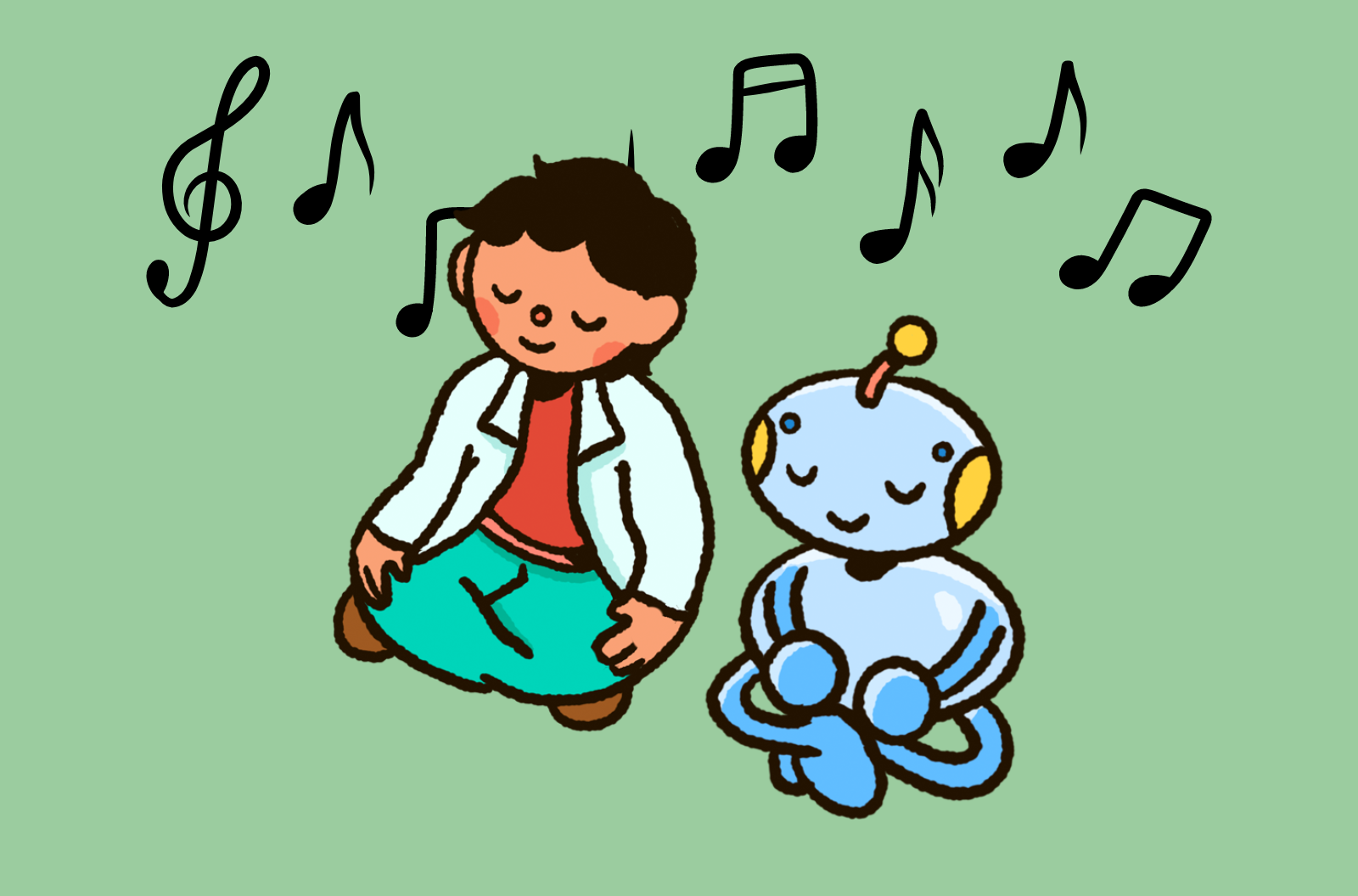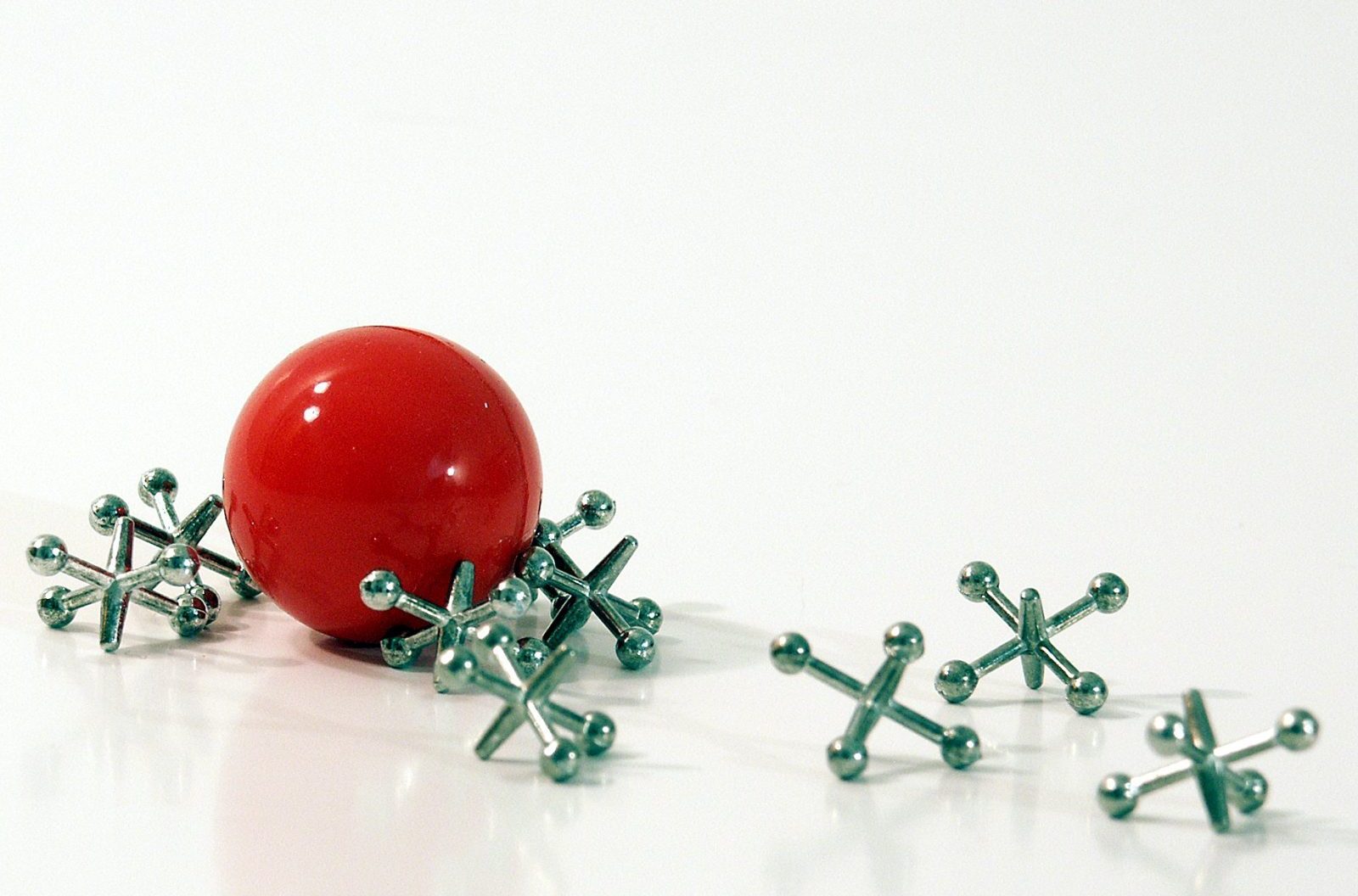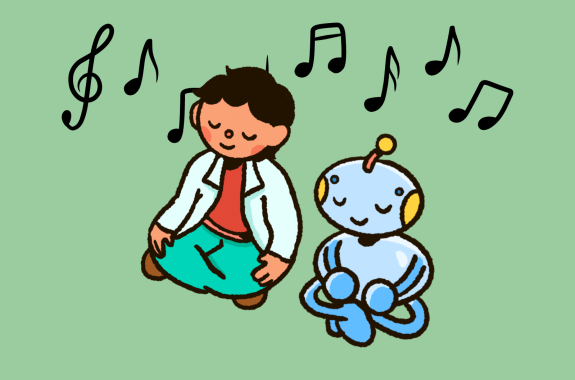Grade Level
6 - 8
minutes
15 min - 1 hr
subject
Life Science
stem practices
Planning and Carrying Out Investigations
Activity Type:
neuroscience, STEAM, family activities, After School Activity, brain
Este recurso está disponible en español. This resource is available in Spanish.
Jump to: Video | Puzzle | Trivia

Have you ever seen the game in the photo below before? It’s called Jacks. The game is played by tossing the ball in the air, scooping up the metal jacks with one hand, and catching the ball before it bounces twice. The goal is to collect all, or most, of the jacks.
To play, you’ll need to find a game of jacks, or you can play with a small bouncy ball and ten small objects in place of jacks, like pebbles or erasers.

Jacks is played by scattering the jacks in a small area on the floor or a table. Player 1 tosses a ball in the air, then quickly grabs one jack before the ball bounces. Then, with the same hand, the player catches the ball just after the first bounce.
Play continues, repeating that action until Player 1 has either picked up each jack, one at a time or has “fouled” and failed to pick up a jack before the ball bounces or failed to catch the ball before it bounces twice. Then, it becomes Player 2’s turn. This goes on until all the jacks have been picked up. That is called the “onsies” round.
When all the jacks are picked up, the jacks are scattered again, and round two begins. You play the same way but have to pick up two jacks per ball bounce. That’s called the “twosies” rounds. Play continues until someone wins that “tensies” round and can pick up all ten jacks at once before the ball bounces.
You can watch this video on how to play.
Try a game of Jacks for yourself. Do you find it fun or stressful? Does it get more challenging as you need to pick up more jacks? How does that feel? Maybe a bit…stressful?
What Is Stress?
Stress can be defined as a physical, chemical, or emotional factor that causes bodily or mental tension. In other words, stress is the process of how we assess, experience, and respond to specific events, or stressors, that we find challenging or threatening. But what does that really mean?
Close your eyes and think about playing Jacks. How did it make you feel? Were you anxious in the beginning? Was it hard to pick up a jack before the ball hit the surface again? Think of another time that you were stressed. What caused you to get stressed out?
Maybe your stressor was an upcoming test, a game, or homework. Maybe it was an argument with a friend? Some stressors can build and simmer, like knowing a test is going to happen in a week. Other stressors can strike quickly with intensity, like if your teacher gives a pop quiz out of the blue and you don’t feel prepared for it.
Generally, a stressor is viewed as a threat or a negative event if you feel that you don’t have the necessary skills—or coping mechanisms—to handle it. For example, you might view a test as a threat if you haven’t studied or know the teacher gives difficult exams. That stressor may cause your body to respond.
What are some ways you experience stress? Do you sweat? Does your heart beat faster? Does your face turn red? Do you feel big emotions like fear or anxiety? That’s all part of being human! Our brains and bodies do extra work in this heightened emotional state. (And it can be exhausting!)

However, with adequate preparation and coping skills, a stressor can feel more like a challenge or positive event. If you feel that the stressor requires effort but you have the skills or strategies to handle it, then stress can make you feel more attentive and alert. It can even help you find focus. For example, if you know a test is coming up and prepare for it, stress may help you be more attentive when studying.
Our Bodies, Our Brains, And Stress
Our bodies are made up of interconnected systems controlled by the brain. These systems each have their own responses to stress. The brain sends signals to the adrenal glands (adrenal medulla and adrenal cortex located above the kidneys), which release stress hormones. These stress hormones are responsible for physiological changes in the body in response to stress.
For example, in the case of the muscular system, if you are stressed, you may feel like your heart is beating out of your chest. Your muscles may tense, and you may feel rigid. You might even develop a headache or pain in your back. The respiratory system responds to stress with shortness of breath, rapid breathing, and, in worst cases, even asthma attacks. Some of the most severe effects of stress are found in the gastrointestinal system, where extreme stress can lead to heartburn, stomach aches, and even vomiting.
When you experience stress, the cardiovascular system releases adrenaline. This hormone increases your heart rate and breathing, causing what we refer to as the “fight-or-flight response.” The fight-or-flight response is so named because it describes what you might do in response to a sudden threat. Let’s say you are walking in the woods, and you see a bear. What would you do? You could try to fight the bear and defend yourself, or you could run away, choosing flight.
Even though you rarely have such dangerous experiences as encountering a bear, your brain can still interpret stressors in much the same way. That test coming up tomorrow won’t physically hurt you, but stressing about it will still cause your body to release adrenaline, launching you into a physical and mental stress response.
Anyone Can Cope With Stress
How you approach stressors can help you control how your body reacts to them. Changing how you think about the stressor can determine how your brain and body will react.
Focusing only on the negative side of stress can cause you to feel overwhelmed. Over time, the repeated physiological effects of stress can cause health-related issues. Have you ever heard someone say that happier people live longer? Not coping with stress or having chronic stress can harm your health by damaging your heart, affecting your ability to sleep, or suppressing your immune system.

In contrast, learning to deal with stress can help you lead a healthier life. For instance, if you think about an upcoming test with a positive attitude and show up with a big smile, you will improve your mood, and the stress you’re feeling will lessen a little bit. If you are surprised with a pop quiz, take a moment to breathe, think about what you’ve learned, and remind yourself that you have the skills to do well.
There are several strategies for dealing with stress in the long term.
- Ask for help from a trusted adult.
- Eat nutritious foods.
- Get enough sleep.
- Get regular physical activity.
- Use the positive aspects of stress to help you focus and overcome challenges.
- Practice mindfulness. Try yoga and meditation.
But what about when stress catches you by surprise? Don’t worry! There are things you can do:
- Just breathe: Inhale, then exhale nice and slowly. Don’t rush it.
- Close your eyes and slowly count to 10.
- Chew a piece of gum.
- Ask for help. Call a friend or reach out to your trusted adult.
- Pet a cat or dog for ten minutes. Really. It works!
- Stop and listen to your favorite calming music.
- Take a 15-minute walk, shoot hoops with a friend, lift some hand weights, or do energizing seated stretches.
What would you add to this list of strategies? What helps you when you’re stressed?
Brain Teaser
You can’t completely avoid stress, but you can learn to cope with it by flipping the script and thinking of a positive way to channel how you’re feeling. In this puzzle, you’ll need to pair a stressor with a potential coping skill. But it’s not so easy as just matching. Sometimes when you’re stressed, it’s hard to think straight. We’ve hidden and distorted the words in this puzzle to make them harder to read, simulating how it can feel when you’re under stress. Don’t worry though! You’ll have the tools you need to cope.
There are three versions of the puzzle, each with a different level of difficulty. In all versions, there are five stressor cards labeled with letters and five coping skill cards with numbers. Start by printing the puzzle of your choice and cutting out the cards along the dotted lines. Mix the cards up.
Next, read the cards. The most challenging version of the puzzle uses a red film decoder. (You can make your own using clear plastic, like plastic wrap, colored with a red permanent marker.) Hold your decoder over the cards to read the text. The second version uses a mirror. Hold the cards up to a mirror to read the text. The final version does not need a decoder or mirror.
Whichever version you choose, start by placing your stressors in alphabetical order. Then match a coping skill to each stressor. The numbers will reveal the secret code. Enter the code into the Science Friday Enigma Machine to find out if you’re right and get your digital badge.
Did you love this challenge? This activity and puzzle are part of the Hack Your Brain neuroscience escape room.
Download the puzzle! Enter the code!

Check Your Knowledge
See how much you remember from your reading! These ten questions will test your recall. Both versions below are free. Kahoot! is a fun game-based platform with pictures and music. Google is a more traditional online quiz format.
Working with a group? You can host your own Kahoot! live or copy the Google form and assign it to a class. Both require logins.
Want To Learn More?
Here are some great resources for you to check out!
- What is mood, exactly? In this resource from the Dana Foundation, learn how to understand mood.
- Have you ever tried fidget spinners? Do they work? Science Friday asks, “Can You Fidget Away Your Anxiety?”
- Did you know exercise can help you deal with stress? It can! Small changes can lead to big benefits for your physical and mental health. Move Your Way has tools, videos, and fact sheets that make it easy to get more active.
- Are you looking for ways to manage stress? YouthSmart has free stress management and mindfulness workbooks to help you get started.
- Parents, it can be challenging to recognize the signs of stress in kids. The American Psychological Association has tips for spotting stress in your children and helping them cope.
NGSS Standards
- MS-LS1-8 From Molecules to Organisms: Structures and Processes: Gather and synthesize information that sensory receptors respond to stimuli by sending messages to the brain for immediate behavior or storage as memories.
Special thanks to the Dana Foundation for funding Hack Your Brain.

Credits
Lesson by Svea Anderson
Neuroscience Consultation by Daisy Reyes
Game Design by Lucas Leprince
Illustration by Joy Ho
Puzzle illustration by Fai Kosciolek
Developmental Editing by Sandy Roberts
Copyediting by Ariel Zych
Digital Production by Ariel Zych
Educator's Toolbox
Meet the Writers
About Svea Anderson
Svea Anderson is a twenty-year veteran educator who never hesitates to step out of her comfort zone and try something new. She enjoys a challenge and never passes up an opportunity to learn something new.
About Sandy Roberts
Sandy Roberts is Science Friday’s Education Program Manager, where she creates learning resources and experiences to advance STEM equity in all learning environments. Lately, she’s been playing with origami circuits and trying to perfect a gluten-free sourdough recipe.
